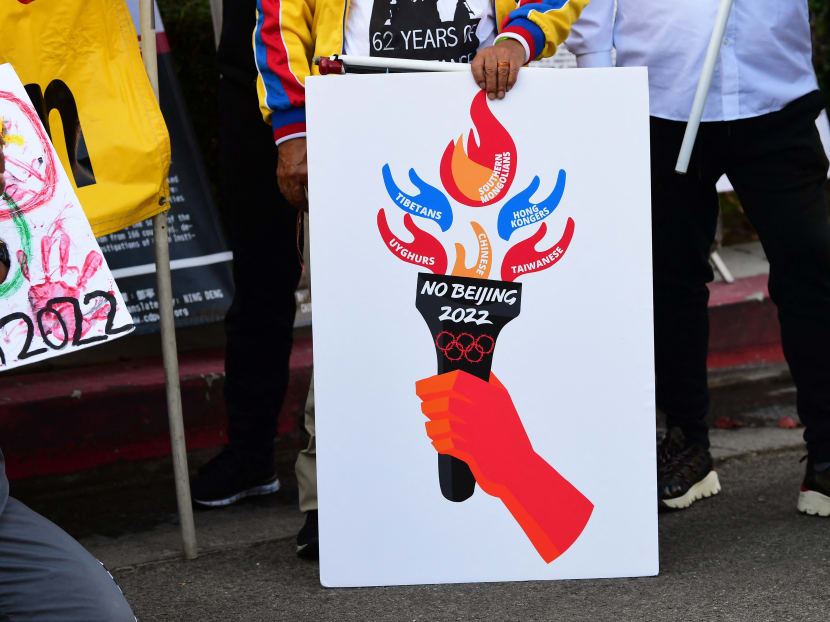US mulls diplomatic boycott of Beijing Olympics
WASHINGTON — President Joe Biden said Thursday (Nov 19) he was considering a United States (US) diplomatic boycott of the Winter Olympics in Beijing, in what would be an attempt to show toughness over China's rights abuses without impacting US athletes.

Activists rallied in front of the Chinese Consulate in Los Angeles on Nov 3, 2021, calling for a boycott of the 2022 Beijing Winter Olympics due to concerns over China's human rights record.
WASHINGTON — President Joe Biden said Thursday (Nov 19) he was considering a United States (US) diplomatic boycott of the Winter Olympics in Beijing, in what would be an attempt to show toughness over China's rights abuses without impacting US athletes.
That is "something we are considering," Mr Biden told reporters while meeting with Canada's prime minister, Mr Justin Trudeau, at the White House. The Beijing Olympics take place next February.
Mr Biden's comment followed a video summit with Chinese counterpart Xi Jinping late Monday, during which the two leaders said they wanted to ensure stability and prevent accidental conflicts.
However, Mr Biden is under pressure at home to speak out on China's human rights abuses, especially in Xinjiang where the US government says repression of the Uyghur ethnic group qualifies as genocide.
On Tuesday, The Washington Post reported that the Biden administration would soon announce a diplomatic boycott, meaning that while athletes would still compete, government representatives would not be in the stands.
White House officials said that the issue was not raised during the Biden-Xi virtual summit.
NO DECISION YET
Under Mr Biden's predecessor Donald Trump, US-Chinese relations hit a low point with a massive trade war and incendiary debate over how the Covid-19 virus first emerged in the Chinese city of Wuhan.
Mr Biden has sought to reengage with Beijing, while at the same time focusing on strengthening traditional US alliances to counter China's ever-growing economic clout and military presence across the Indo-Pacific region.
He has held two lengthy phone calls with Mr Xi and was keen to meet in person. However, with the Chinese leader not traveling outside of the country since the start of the Covid pandemic, this week's virtual summit was the only possible next step.
Following Mr Biden's mention of a possible Olympics boycott, Press Secretary Jen Psaki said she did not "have an update on what our presence will be."
"I want to give the national security team and the president space to make the decision," she said.
For Mr Biden, that decision will be part of a complex diplomatic balancing act.
His administration has left Trump-era trade tariffs on China in place and continues to order naval patrols through sensitive international sea lanes that China is accused of trying to bring under its control.
However, with Mr Biden also emphasizing the need for dialogue, critics on the right say he is being too soft.
This makes the looming Olympic Games a political flashpoint.
"The United States must implement a complete and total boycott of the Beijing Winter Olympics. The threat to our athletes and China’s crimes against humanity leave us no other option," Republican Senator Tom Cotton tweeted Thursday.
Ms Psaki said the White House sees US-China relations "through the prism of competition, not conflict."
However, she added "we have serious concerns" about human rights. AFP









